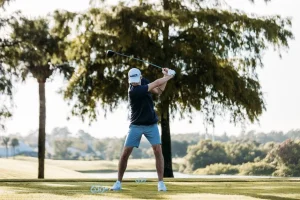PGA Tour’s Distance-Measuring Device Experiment Yields Mixed Results
The PGA Tour’s five-week experiment with distance-measuring devices (DMDs) wrapped up at last week’s PGA Championship, and players remain divided on whether the technology actually improves pace of play.
"Honestly, not really," Rickie Fowler said when asked if rangefinders helped speed up rounds. "In certain situations if you were off-line, it makes it a little easier. Certain circumstances it helps speed up that shot, but the last few weeks I’d stepped off my number, [caddie Rick Romano] would shoot it, so our process didn’t change."
The test period began at last month’s RBC Heritage and included seven tournaments. While the Tour is still analyzing data, one consensus has emerged – DMDs didn’t hurt pace of play, but whether they significantly helped remains unclear.
"I don’t know that we can definitively say that it improves pace of play and I think that’s why we felt it was really important to stop allowing them to use them; we called it a test period for a reason," said Gary Young, the Tour’s senior vice president of rules and competition. "They’ve had this shiny new toy for awhile; if we take it away from them we are more likely to get feedback."
The Tour plans to survey players and caddies about their experiences, with the Player Advisory Council set to review the data at next week’s meeting during the Memorial Tournament.
Generational Divide
Young has been gathering feedback at Colonial Country Club this week and describes the responses as a "mixed bag." There’s a clear generational split in opinions.
"A lot of them feel like it’s what separates the really good caddies from the so-so caddies out here, the ability to calculate those angles properly," Young said. "And then you had the other side who said, if this is about speeding up play then we should be using them."
Veterans tend to oppose making DMDs permanent, while younger players who grew up using rangefinders in tournaments are more supportive.
"Personally, I don’t like it, I like pacing my yardages and a little more old school, but I understand why we are trying to do it, trying to shave a couple of minutes off a round," Camilo Villegas said at the Charles Schwab Challenge. "But at the same time if we shave two or three minutes is that our goal? I don’t know."
Where DMDs Helped Most
Most agree the technology was most useful in two specific situations:
- For wildly off-line shots with few reference points
- For shorter shots that normally require pacing off distances
But some worry DMDs might actually add time to the process rather than streamline it.
"We definitely saw that it was an extra step in the process rather than reducing the steps," Young noted. "I would say the ones who are not in favor of it think that this did nothing more than add an extra step."
There’s even been a case on the Korn Ferry Tour where a player received a "bad time" penalty because they went back to shoot a distance a second time with their rangefinder.
Pace of Play Remains Priority
The DMD experiment is just one part of the Tour’s broader effort to address pace of play concerns. The Korn Ferry Tour implemented a stricter timing policy during the same period, allowing for a one-stroke penalty after the first "bad time" rather than the second.
"[The Korn Ferry Tour] has definitely seen both an improvement to their pace of play and they’ve seen less timings taking place," Young said. "It was really important that we stop the DMD usage and continue with the pace-of-play policy change to determine which one was having the bigger effect."
Pace of play became a hot topic earlier this season when Golf Channel’s Frank Nobilo criticized Tom Kim during the AT&T Pebble Beach Pro-Am broadcast. After Kim took more than a minute to hit an approach shot, Nobilo commented, "It was not worth the wait."
That public criticism seems to have made an impact. "We have seen our pace of play improve across the board ever since this came to a head at Pebble Beach," Young said. "Some of it is just a little more awareness from the players that something else could be coming down the line that they don’t want. I’m sure they heard all the talk about things like a shot clock and I think their opinion is that doesn’t belong in our sport."
Whether rangefinders become a permanent fixture on Tour remains to be seen, but one thing is clear – the push for faster play isn’t going away.




